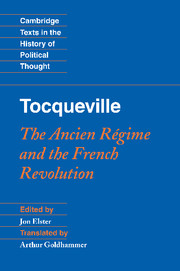Book contents
- Frontmatter
- Contents
- Introduction
- Bibliographical Note
- Chronology
- TOCQUEVILLE: THE ANCIEN RÉGIME AND THE FRENCH REVOLUTION
- Foreword
- Book I
- I.1 Contradictory Judgments of the Revolution at Its Inception
- I.2 That the Fundamental and Final Purpose of the Revolution Was Not, as Some Have Thought, to Destroy Religious Authority and Weaken Political Authority
- I.3 How the French Revolution Was a Political Revolution That Proceeded in the Manner of Religious Revolutions, and Why
- I.4 How Almost All of Europe Had Exactly the Same Institutions, and How Those Institutions Were Crumbling Everywhere
- I.5 What Was the Essential Achievement of the French Revolution?
- Book II
- Book III
- Appendix: On the Pays d'états, and in Particular Languedoc
- Notes
- Index
- CAMBRIDGE TEXTS IN THE HISTORY OF POLITICAL THOUGHT
I.2 - That the Fundamental and Final Purpose of the Revolution Was Not, as Some Have Thought, to Destroy Religious Authority and Weaken Political Authority
Published online by Cambridge University Press: 05 June 2012
- Frontmatter
- Contents
- Introduction
- Bibliographical Note
- Chronology
- TOCQUEVILLE: THE ANCIEN RÉGIME AND THE FRENCH REVOLUTION
- Foreword
- Book I
- I.1 Contradictory Judgments of the Revolution at Its Inception
- I.2 That the Fundamental and Final Purpose of the Revolution Was Not, as Some Have Thought, to Destroy Religious Authority and Weaken Political Authority
- I.3 How the French Revolution Was a Political Revolution That Proceeded in the Manner of Religious Revolutions, and Why
- I.4 How Almost All of Europe Had Exactly the Same Institutions, and How Those Institutions Were Crumbling Everywhere
- I.5 What Was the Essential Achievement of the French Revolution?
- Book II
- Book III
- Appendix: On the Pays d'états, and in Particular Languedoc
- Notes
- Index
- CAMBRIDGE TEXTS IN THE HISTORY OF POLITICAL THOUGHT
Summary
One of the French Revolution's first acts was to attack the Church, and among the passions born of the event the first to be kindled and the last to be extinguished was the irreligious passion. Even after enthusiasm for liberty had vanished and the French were reduced to paying for tranquility with servitude, still they rebelled against religious authority. Napoleon, who had been able to vanquish the Revolution's liberal genius, tried in vain to tame its anti-Christian spirit. Even in our own time we find men who believe they can redeem their servility to the pettiest of officials by their insolence toward God and who, even as they have abandoned all that was freest, noblest, and proudest in the doctrines of the Revolution, still boast of remaining true to its spirit by rejecting religion.
Today, however, it is easy to see that the war on religion was merely an incidental aspect of the great Revolution, a salient yet transitory feature of its physiognomy, a temporary consequence of ideas, passions, and specific circumstances that preceded the Revolution and laid the groundwork for it, rather than of the revolutionary spirit itself.
Eighteenth-century philosophy is rightly regarded as one of the principal causes of the Revolution, and it is true that that philosophy was deeply irreligious. It is essential, however, to note that it consisted of two distinct and separable parts.
- Type
- Chapter
- Information
- Tocqueville: The Ancien Régime and the French Revolution , pp. 15 - 18Publisher: Cambridge University PressPrint publication year: 2011

